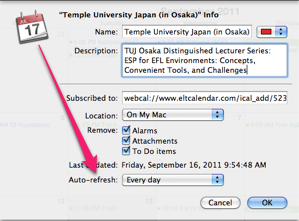Kitakyushu JALT:
�(1) Freeing Up Fluency in a Silent Speaking Class; (2) Katakana Usage
Date: Saturday, May 14th, 2016 Time: 6:30 PM - 8:00 PM
Speaker: (1) Steve Paton (Fukuoka University) (2) Yumiko Cochrane (Tokyo International Business College and Kyushu Sangyo University)
Description:
Freeing Up Fluency in a Silent Speaking Class
Steve Paton (Fukuoka University)
In speaking classes with English majors, I'd become disappointed that students weren't taking advantage of the opportunity to speak, and to learn through experience. Many students were using too much Japanese, or hiding silently behind their more enthusiastic classmates. In the second semester, I instigated a new, experimental assessment design that would reward active participation, rather than accuracy or "correctness." More importantly, though, I gave the students a comprehensive, organized explanation of my reasoning, hoping it would change their perception of the course. I heard more English during the next few lessons than I'd heard in the entire first semester! My explanation had really resonated, and the students opened up, apparently no longer burdened by a concern with accuracy. In this presentation, I'll go through what I presented to the students, discuss why I think it was so effective, and show how I applied what I learned to subsequent classes.
Katakana Usage
Yumiko Cochrane (Tokyo Internation Business College and Kyushu Sangyo University)
Katakana words constitute an integral component of the lexicon of Japanese. While Katakana is primarily used to transcribe foreign words into Japanese and introduce objects or concepts of foreign origin, its usage in modern Japanese is so pervasive that its effects, particularly on English acquisition, are immense. With a primary emphasis on the importance of raising awareness towards false friends, this presentation discusses issues and implications involving English-like katakana words (loanword cognates) and possible long-term effects they may have on English acquisition. It first introduces key linguistic features of loanword cognates and how they are used in Japanese discourse. Results of the presenter's exploratory study will also be presented to show how Japanese adults performed in producing English equivalents to the lexical items on the test. The presentation also reviews some of the loanword cognates commonly used in modern Japanese discourse.
Organization: Kitakyushu Chapter of the Japan Association for Language Teaching (Kitakyushu JALT)
Cost: JALT Members: free
Non-members: 1000 yen
Venue: Wel Tobata Room 81 (map)
Location: Kitakyushu City, Fukuoka Prefecture, Japan
![]() Add this to iCal
Add this to iCal
![]() (Need help?)
(Need help?)
![]() Add to Outlook
Add to Outlook
![]() (Need help?)
(Need help?)
You can add this event to your iCal calendar.
- Click on the iCal icon. Your iCal software will start.
- Click 'Subscribe':

- Under 'Auto Refresh', select 'Every day' in case the the basic details change:

You can add this event to your Microsoft Outlook calendar.
- Click on the MS Outlook icon.
- See what happens.
- Tell us what happens. I don't have MS Outlook on a Windows computer, so I can't test it.
- If you click on the icon and nothing happens, do this:
- Right-click on the icon and save the file.
- According to Microsoft's support page, in Outlook's File menu, you should click Import and Export.
- Click to select Import an iCalendar or vCalendar file (*.vcs), and then click Next.
- Click to select the vCalendar file you've just saved, and then click Open.
Contact Kitakyushu JALT
Website: hosted.jalt.org/chapters/kq/
Email QR Code:





